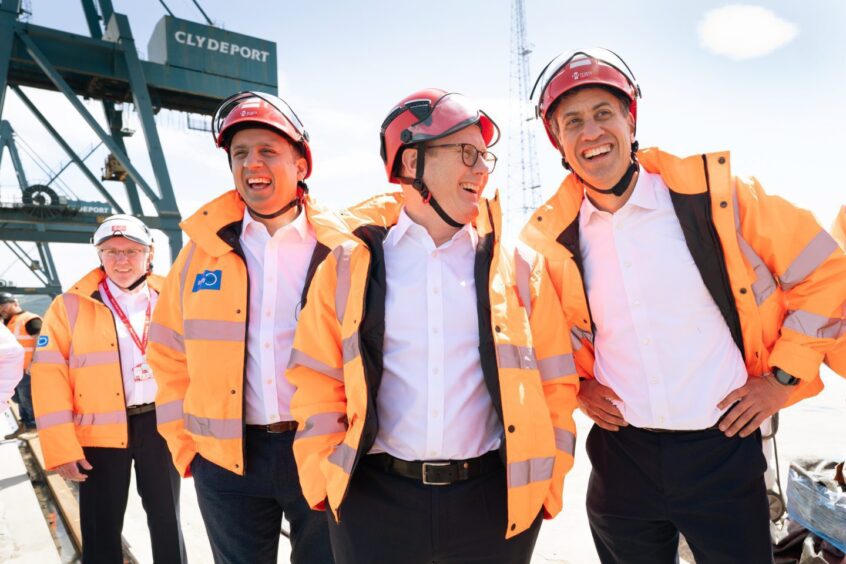
Following the first budget of the Labour Party’s premiership, saving jobs and retaining skills within the sector are the core concerns of Decom Mission’s Sam Long.
The chief executive of the trade association which specialises in decommissioning within the energy sector explained what he will be doing to argue in favour of the sector.
Long explained: “We are more interested in the supply chain and the jobs and the projects and the best practice and the export potential.”
Last week saw the UK Government deliver its first budget in which UK oil and gas firms received a 3% tax hike under the energy profits levy (EPL) while investment allowances disappeared.
However, the industry was told this was coming months in advance, the new information delivered by chancellor Rachel Reeves was the controversial EPL will not come to an end until March 2030.
The previous “sunset” for the levy was pushed back from March 2028 to 2029 under the previous government.
Understanding the risk to jobs
Trade body Offshore Energies UK has strongly opposed Labour’s plans for the oil and gas industry and the Decom Mission boss said that it is important that OEUK continue to fight the corner of the sector.
That being said, he is looking longer term and Decom Mission believes that the writing is on the wall for the future of the EPL and therefore the ramifications of the changes are what the trade body is focussing on.
“I don’t want ministers to think that they can effectively accelerate the demise of the basin and everything will be alright because everybody will be employed to decommissioning,” he added.
“I want to appear as decommissioning expert in front of them [ministers] and say that’s not true.”
When looking at London and the perception the government has of the oil and gas industry, the Decom Mission CEO claimed that hydrocarbons are not looked upon favourably.
“I went to a parliamentary group meeting not long ago you walked through the door and there’s about 20 of us who have all come down from Aberdeen for the event.
“And you’re like, how does that feel to a London-based professional when we all walk through the door? I don’t know.”
He added: “We need multiple channels to try and convey the same point, at the end of the day the core concern is around the employment and the skill transition and the danger that assumptions are made, that everything’s going to be fine and you’re kind of like, no, we’re all worried that it’s not going to be fine.”
Long said that he doesn’t think ministers “understand the jobs risk” associated with the moves they are making.
Long commented: “The perception of the oil and gas sector is still pretty poor and there’s work to be done there to explain. I spend a lot of time in London explaining to people that this is 200,000 people but they don’t all work for BP, they don’t all work for TotalEnergies, the majority of them work in the supply chain.
“They’re across the whole of the UK, they’re not all sitting in Aberdeen.”
The Decom Mission boss later added: “My primary concern at the moment is much more about doing something about the jobs.”
The logistics of ending North Sea production
He also pointed to the fact that the UK North Sea cannot move away from hydrocarbon production overnight.
Long said: “This isn’t all doom and gloom, even if even if Labour come in with the hardest card they can play and everybody goes, ‘Oh my God, it’s an absolute disaster!’
“You just can’t turn the taps off overnight, you cannot physically shut down a hydrocarbon asset just because the tax has changed, you’re going to have to spend some of that money.”
That being said, Long is concerned that the reason why the government has not listened to the warnings of the industry is that oil and gas organisations are perceived as whiney.
The Decom Mission CEO does have a reason to be positive. He explained that following the political uncertainty the UK has experienced in recent years, the stability of government can help businesses.
Long added: “The previous administration never really got set on an industrial strategy. It just kept changing and kept changing, and kept changing, the advantage of having a new government coming on – whichever political persuasion it is –is that we might get it right.”
The idea of the UK developing an industrial strategy is positive for Long’s team and he believes that now the budget has passed, the government can focus on that.
“To me the conversation needs to be flipped post-budget to ‘What are we doing about industrial strategy in the UK?’
“You [referring to government] want to set very ambitious targets around the energy transition. Can we have a realistic discussion about how many of those jobs can be transferred, how we transfer them and how quickly it can happen, rather than just policy and manifesto commitments that you’ve made?”
To deliver this, the “onus” is on the government, Long said in a conversation with Energy Voice.
Industrial strategy needed to mitigate oil and gas woes
He said that Keir Starmer’s government must “acknowledge that they have chosen to accelerate the decline of oil and gas, therefore, they also need to address that in industrial strategy.”
Since coming into power, the Labour government has focused heavily on renewables and energy transition technologies, lifting the defacto ban on onshore wind in England, upping the budget of the contracts for difference scheme (CfD) and delivering £22 billion in funding for the Track 1 carbon capture storage (CCS) projects.
“The real concern is actually around the jobs,” Loing added.
“The transition cannot happen quickly enough, Labour’s targets are too high. We don’t have the materials or the people to execute them and they’re not going to employ the same kind of people. Some people will happily make the transition, some people won’t.
“We will need a workforce to execute decom but … I don’t blame the operators for being annoyed.”
However, those campaigning on behalf of the industry must look to Holyrood as well as Westminster, Long said.
As a Scottish election rears its head, those championing the sector should be looking to what the Edinburgh-based government can do with its devolved powers, the Decom Mission boss argued.
“This isn’t all about London, and that’s the other thing that I get a little bit annoyed with at the moment is everybody thinks the conversations in London,” he said in conclusion.
“We need to remember that we have devolved powers, we have a devolved government, they can do different things and there are some commendable things that the Scottish Government does.
“I would encourage our community to not just focus on London. There is also a discussion to be had with Holyrood about skills and employment in Scotland and what to look for in the future.”
Recommended for you

 © Supplied by DC Thomson
© Supplied by DC Thomson © Shutterstock
© Shutterstock © Supplied by PA
© Supplied by PA